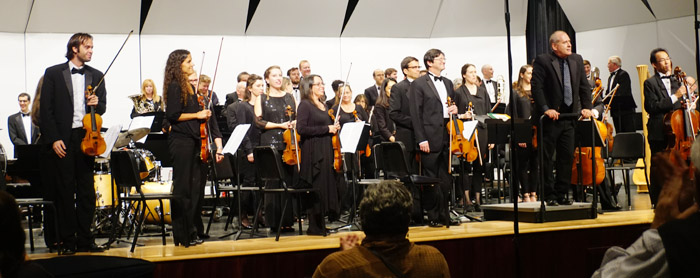By Patrick Daley, Chronicle Staff Writer
On Sunday, the Glens Falls Symphony dashed from the starting line in what will be a marathon season of exclusively Ludwig van Beethoven and Leonard Bernstein, celebrating the composers’ 250th and 100th birthdays (in 2019 and 2018, respectively).
Opening the festivities was Beethoven’s Overture to The Creatures of Prometheus, an intentional choice equating both composers to the Titan who stole fire from the gods and gave it to the humans, thus enabling civilization and progress.
“They [Beethoven and Bernstein] gave us something as essential as fire,” said Charles Maestro Peltz in his pre-concert talk (which I highly recommend), calling the composers “deeply brave” people who “ignored consequences.”

Prometheus opens with a restrained theme but has a very unrestrained ending. It was interesting to watch, between timpanist Nicholas Tariello’s as-quiet-as-humanly-possible playing (which I believe is much harder than playing loud) to the interplay between the players with leads and the orchestra that supports and urges them on.
Following was Beethoven’s First Symphony, with its humorously deceptive key notations and a plethora of false endings that paint for me a picture of a daring young composer who is starting to have enough artistic security to take risks.
The first movement contains so many dominant-to-tonic leads that the augmented fourth near its end could be the greatest punchline ever (“Wait for it…”). The second is a playful volley that never spins away, with precisely crafted rests and note values. In the third, Beethoven shows why he’s the master of variations, and the fourth movement brings us back around. Shout out to the violins and trumpets for their extremely delicate playing. Maybe I’ll start my own Quiet Music Awards.
At the end of the concert’s first half, I thought, “This is an orchestra to be proud of.”
Dexterous, responsible, impeccable.
So, now on to Bernstein. I’ll comfortably admit that I prefer Beethoven, as I guessed most people would. Well, I was wrong: His Symphonic Dances from West Side Story to open the concert’s second half drew a standing ovation mid-program. It is a show stopper, calling for piano, harp, drum set, auxiliary percussion, more brass, more reeds, even parts for voice (“Mambo!”). It’s visual in the way that musicals are; lots of key changes, varying time signatures, quick twists and turns, music that keeps up with the more visual ingredients in Broadway’s triple threat: dance and acting.
After that demanding suite, the Overture to Candide to end was really a new beginning. “Pure joy,” as Maestro called it.
I agree. To me, the piece’s unrelenting parade of catchy, perfect figures was like listening to a carefully curated playlist of hits from one’s formative years.
Candide and West Side Story are two examples of Bernstein’s need for art to explore political and social issues. As such, the least his music deserves is a place in a dedicated season study, if not much more.
It must take diligence and deliberation to shape a full season dedicated to only two composers, and Sunday’s concert was the evidence of the careful thought that Maestro Peltz has put into the celebration.
“I don’t think we remember people very well,” he said in his pre-concert talk. “We have a responsibility to celebrate people who are not here.”
“We’ve made a statement so that it might last,” he said of the music. “It’s not enough to play the birthday piece and put it away.”
Copyright © 2018 Lone Oak Publishing Co., Inc. All Rights Reserved.
 Glens Falls Chronicle Serving the Glens Falls/Lake George region; Warren, Washington and northern Saratoga counties since 1980
Glens Falls Chronicle Serving the Glens Falls/Lake George region; Warren, Washington and northern Saratoga counties since 1980

